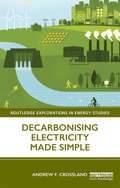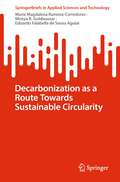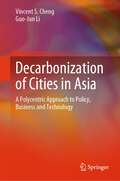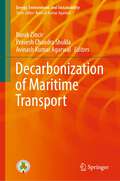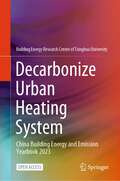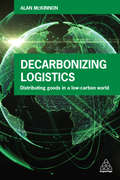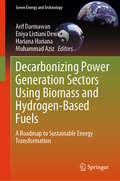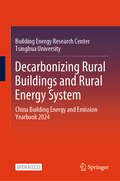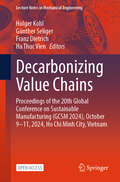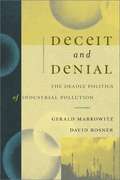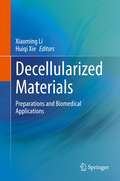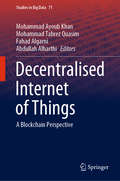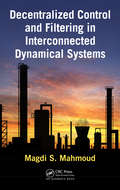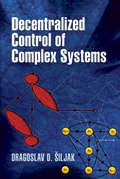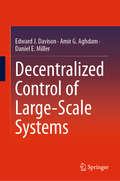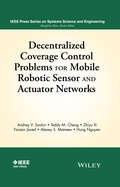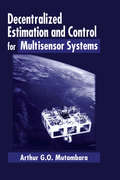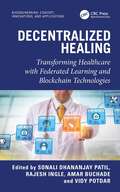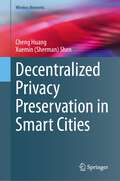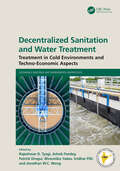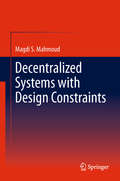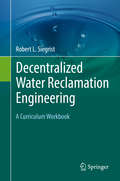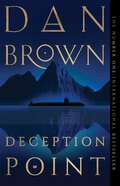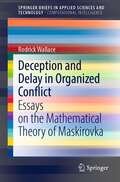- Table View
- List View
Decarbonising Electricity Made Simple (Routledge Explorations in Energy Studies)
by Andrew F. CrosslandThis book assesses how low-carbon generation, the advance of energy storage and consumer-based models can help decarbonise electricity supplies at a national level. This book is built around developing a decarbonised electricity mix for Britain which reduces fossil fuels from 50% of supply in 2018 down to levels within 2030 carbon targets. Crossland explores the idea of a future energy storage mix which blends domestic batteries, vehicles, thermal stores and pumped hydro to provide a flexible, responsive electricity system. He then goes on to look at how much storage can contribute to decarbonisation in a multitude of contexts – from domestic to national electricity. This book also discusses how efficiency and self-sufficiency can bring about a decarbonised electricity use within our homes today. Britain is used as the main example, but the themes and conclusions are applicable to a global audience, and each chapter draws on practical case studies from around the world to illustrate key ideas. Drawing on the author’s experience in delivering and analysing low-carbon energy projects in the UK, Sub-Saharan Africa, Latin America and Oceania, this book will be of great relevance to students, scholars and industry specialists with an interest in energy technology, policy and storage.
Decarbonization as a Route Towards Sustainable Circularity (SpringerBriefs in Applied Sciences and Technology)
by Maria Magdalena Ramirez-Corredores Mireya R. Goldwasser Eduardo Falabella de Sousa AguiarThis book surveys the current research on CO2 conversion processes and shows that these can close the carbon cycle as part of a circular economy. The technical and economic feasibility of these processes are examined together and current scientific challenges are signposted, which will guide future R&D. Technology sustainability is key for meeting and keeping decarbonization goals in the long term. However, considering economic and environmental sustainability individually is not enough. An integral view of sustainability that incorporates an energy term in the equation is needed. This book brings this concept to the fore.
Decarbonization of Cities in Asia: A Polycentric Approach to Policy, Business and Technology
by Vincent S. Cheng Guo-Jun LiThis book provides best practices for decarbonizing cities in East Asia, in which buildings are the major contributor to carbon emissions. Beyond the global commitment through the Paris Agreement to make collective efforts on climate action and accelerated policies, investment and development at the country and city level to combat climate change are occurring at an unprecedented rate. Rapid urbanization and increasing energy demand for large and dense Asian cities require smart and sustainable strategies to balance development with decarbonization. A poly-centric approach is needed, where a combination of policy-, market- and technology-driven changes can aid the transition towards development of carbon neutral cities. With practical examples in the implementation of the United Nations Sustainable Development Goals, green financing, climate action roadmap and policy, deployment of renewable energy, and low- to zero-carbon buildings, readers can find the motivation, considerations and implementation pathways to facilitate the transition into the new normal. It is the hope of the authors to encourage readers to see successful pathways in transitioning into a carbon-free industry and overcoming the effects of climate extremes.
Decarbonization of Maritime Transport (Energy, Environment, and Sustainability)
by Avinash Kumar Agarwal Pravesh Chandra Shukla Burak ZincirThis contributed book focuses on decarbonization of maritime transport by highlighting different aspects of decarbonization methods indicated in the International Maritime Organization’s Initial Greenhouse Gas Strategy (2018). The book contains studies on alternative fuels and alternative energy systems with their life cycle assessment, electrification and hybridization of ships, carbon capture technologies, green port concept, energy efficiency management, and market-based measures. This book will be of interest to those working in academia and industry in maritime technologies and transportation.
Decarbonize Urban Heating System: China Building Energy and Emission Yearbook 2023
by Building Energy Research Center of THUThis is an open access book.The double-carbon target has been one of the main motivations and goals for China's social and economic development. The building sector is one of the most important sectors to achieve energy saving and emission reduction. This publication thoroughly examines China's building energy use and carbon emissions with a focus on four categories, including their characteristics and the technologies needed to achieve zero carbon emissions.This year, the key issue is developing carbon-neutrality pathways for China's urban heating system. This report comprehensively discusses the current status and future forecast of heat demand in buildings and non-process industries, introduces the challenges facing the urban energy supply system in achieving carbon neutrality, and elucidates the low-carbon heating model based mainly on low-grade and low-carbon waste heat. Extensive survey and monitoring data and case studies are presented throughout the book. The discussion of technologies and policies has been the subject of extensive research and evidence for over a decade. The information, data, and policy recommendations are of relevance to a national and global audience working in the fields of energy, climate change, engineering, and building science.
Decarbonizing Logistics: Distributing Goods in a Low Carbon World
by Prof Alan McKinnonLogistics accounts for around 9-10% of global CO2 emissions and will be one of the hardest economic sectors to decarbonize. This is partly because the demand for freight transport is expected to rise sharply over the next few decades, but also because it relies very heavily on fossil fuel. This book outlines the nature and extent of the challenge we face in trying to achieve deep reductions in greenhouse gas emissions from logistical activities. It makes a detailed assessment of the available options, including restructuring supply chains, shifting freight to lower carbon transport modes and transforming energy use in the logistics sector. The options are examined from technological and managerial standpoints for all the main freight transport modes.Based on an up-to-date review of almost 600 publications and containing new analytical frameworks and research results, this book is the first to provide a global, multi-disciplinary perspective on the subject. It is written by one of the foremost specialists in the field who has spent many years researching the links between logistics and climate change and been an adviser to governments, international organizations and companies on the topic.
Decarbonizing Power Generation Sectors Using Biomass and Hydrogen-Based Fuels: A Roadmap to Sustainable Energy Transformation (Green Energy and Technology)
by Muhammad Aziz Arif Darmawan Eniya Listiani Dewi Hariana HarianaThis book presents a comprehensive overview of important issues and topics concerning the combustion and cofiring of biomass and hydrogen-based fuels such as ammonia in the power generation sector. In recent years, the energy sector has been responsible for around three-quarters of global greenhouse gas (GHG) emissions. Cofiring of coal with agricultural and forestry wastes and low-emissions hydrogen and ammonia could reduce GHG emissions from power plants and may offer a cheaper option to achieve Net Zero Emissions (NZE). This book provides an updated review of combustion and co-combustion technologies, especially for ammonia and hydrogen cofiring, which includes technical issues, emission reduction, and by-product problems. It goes into an in-depth discussion of hydrogen and ammonia "exclusive" combustion for power generation to reduce CO2 emissions. The content caters to students, academic and industry researchers, and policymakers who are interested in decarbonizing power generation sectors using biomass and hydrogen-based fuels.
Decarbonizing Rural Buildings and Rural Energy System: China Building Energy and Emission Yearbook 2024
by Building Energy Tsinghua UniversityThis open access book focuses on China’s building energy consumption and CO2 emissions, to discuss the status quo of China’s building energy in four categories, their characteristics and technologies to improve energy efficiency and achieve zero-carbon emission. Carbon peaking and carbon neutrality targets have been one of the main motivations and goals for China’s social and economic development. Building is one of the most important sectors to achieve energy saving and emission reduction. In particular, this book discusses the pathways to achieve the carbon neutrality target for China’s rural buildings and rural energy system. This book analyzes the energy system transformation, technology perspectives to implement energy and carbon target in rural building sector. This book consists of large scale of survey data, monitoring data, and case studies. The discussion on technologies and policies is supported by a variety of evidences and continuous research for more than ten years. The information, data, and policy suggestions will be of interest to national and international audiences working in the fields of energy, climate change, engineering, and building science areas.
Decarbonizing Value Chains: Proceedings of the 20th Global Conference on Sustainable Manufacturing (GCSM 2024), October 9–11, 2024, Ho Chi Minh City, Vietnam (Lecture Notes in Mechanical Engineering)
by Holger Kohl Günther Seliger Franz Dietrich Ha Thuc VienThis is an open access book. It gathers the proceedings of the 20th Global Conference on Sustainable Manufacturing, held on October 9–11, 2024, in Binh Duong and Ho Chi Minh City, Vietnam. With a focus on sustainable manufacturing strategies for decarbonizing supply chains, the chapters selected for this book report on models applied to, and results achieved in the mobility, energy, and construction sector, covering both aspects of digitalization and the combined application of circular economy and artificial intelligence. Moreover, they discuss energy-efficient process, reassembly and reuse, and CO2 neutral production, giving a special emphasis to developing sustainable manufacturing in South-East Asia. This book offers extensive and timely information for both researchers and professionals in the field of manufacturing and business development.
Deceit and Denial: The Deadly Politics of Industrial Pollution
by Gerald E. Markowitz David RosnerThis book reveals the public relations campaign to convince Americans to use its deadly product to paint walls, toys, furniture, and other objects in America's homes, despite a wealth of information that children were at risk for serious brain damage and death from ingesting this poison. This book highlights the immediate dangers ordinary citizens face because of the relentless failure of industrial polluters to warn, inform, and protect their workers and neighbors.
Decellularization Methods of Tissue and Whole Organ in Tissue Engineering (Advances in Experimental Medicine and Biology #1345)
by Abdol-Mohammad KajbafzadehThis contributed volume is the first of a series that introduces safe, feasible, and practical decellularization and recellularization techniques for tissue and organ reconstruction. We have put special emphasis on the research areas most likely to develop well-engineered scaffolds for tissue and organ engineering, while presenting easily applicable bench-to-bedside approaches highlighting the latest technical innovations in the field.This book includes both a fundamental discussion for a broad understanding of the basis of tissue repair and substitution, as well as chapters written by world renowned specialists from 20 countries providing deeper discussions and analysis of related sub disciplines.Within these pages, the reader will find state-of-the-art protocols and current clinical challenges in cell and tissue biology, including accurate and comprehensive information on extracellular matrices, natural biomaterials, tissue dynamics, morphogenesis, stem cells, cellular fate progressions, cell and tissue properties for in-vitro and in-vivo applications.This comprehensive and carefully organized treatise provides a clear framework for graduate students and postdoctoral researchers new to the field, but also for researchers and practitioners looking to expand their knowledge on tissue and organ reconstruction.
Decellularized Materials: Preparations and Biomedical Applications
by Xiaoming Li Huiqi XieThis book will consist of 8 chapters, in which important issues regarding decellularized materials (DMs) will be discussed. This book will provide special knowledge of materials for the persons with biomedical background, and special biomedical knowledge for the persons with the background of materials, which will hopefully become a valuable informative read for the researchers and students of biomedical engineering major.
Decentralised Internet of Things: A Blockchain Perspective (Studies in Big Data #71)
by Mohammad Ayoub Khan Mohammad Tabrez Quasim Fahad Algarni Abdullah AlharthiThis book presents practical as well as conceptual insights into the latest trends, tools, techniques and methodologies of blockchains for the Internet of Things. The decentralised Internet of Things (IoT) not only reduces infrastructure costs, but also provides a standardised peer-to-peer communication model for billions of transactions. However, there are significant security challenges associated with peer-to-peer communication. The decentralised concept of blockchain technology ensures transparent interactions between different parties, which are more secure and reliable thanks to distributed ledger and proof-of-work consensus algorithms. Blockchains allow trustless, peer-to-peer communication and have already proven their worth in the world of financial services. The blockchain can be implanted in IoT systems to deal with the issues of scale, trustworthiness and decentralisation, allowing billions of devices to share the same network without the need for additional resources. This book discusses the latest tools and methodology and concepts in the decentralised Internet of Things. Each chapter presents an in-depth investigation of the potential of blockchains in the Internet of Things, addressing the state-of-the-art in and future perspectives of the decentralised Internet of Things. Further, industry experts, researchers and academicians share their ideas and experiences relating to frontier technologies, breakthrough and innovative solutions and applications.
Decentralized Control and Filtering in Interconnected Dynamical Systems
by Magdi S. MahmoudBased on the many approaches available for dealing with large-scale systems (LSS), Decentralized Control and Filtering in Interconnected Dynamical Systems supplies a rigorous framework for studying the analysis, stability, and control problems of LSS. Providing an overall assessment of LSS theories, it addresses model order reduction, parametric un
Decentralized Control of Complex Systems (Dover Books on Electrical Engineering #Volume 184)
by Dragoslav D. SiljakStarting with a graph-theoretic framework for structural modeling of complex systems, this text presents results related to robust stabilization via decentralized state feedback. Subsequent chapters explore optimization, output feedback, the manipulative power of graphs, overlapping decompositions and the underlying inclusion principle, and reliability design. An appendix provides efficient graph algorithms. 1991 edition.
Decentralized Control of Large-Scale Systems
by Edward J. Davison Amir G. Aghdam Daniel E. MillerA large-scale system is composed of several interconnected subsystems. For such a system it is often desired to have some form of decentralization in the control structure, since it is typically not realistic to assume that all output measurements can be transmitted to every local control station. Problems of this kind can appear in electric power systems, communication networks, large space structures, robotic systems, economic systems, and traffic networks, to name only a few. Typical large-scale control systems have several local control stations which observe only local outputs and control only local inputs. All controllers are involved, however, in the control operation of the overall system. The focus of this book is on the efficient control of interconnected systems, and it presents systems analysis and controller synthesis techniques using a variety of methods. A systematic study of multi-input, multi-output systems is carried out and illustrative examples are given to clarify the ideas.
Decentralized Coverage Control Problems For Mobile Robotic Sensor and Actuator Networks
by Teddy M. Cheng Zhiyu Xi Alexey S. Matveev Faizan Javed Hung Nguyen Andrey V. SavkinThis book introduces various coverage control problems for mobile sensor networks including barrier, sweep and blanket. Unlike many existing algorithms, all of the robotic sensor and actuator motion algorithms developed in the book are fully decentralized or distributed, computationally efficient, easily implementable in engineering practice and based only on information on the closest neighbours of each mobile sensor and actuator and local information about the environment. Moreover, the mobile robotic sensors have no prior information about the environment in which they operation. These various types of coverage problems have never been covered before by a single book in a systematic way.Another topic of this book is the study of mobile robotic sensor and actuator networks. Many modern engineering applications include the use of sensor and actuator networks to provide efficient and effective monitoring and control of industrial and environmental processes. Such mobile sensor and actuator networks are able to achieve improved performance and efficient monitoring together with reduction in power consumption and production cost.
Decentralized Estimation and Control for Multisensor Systems
by Arthur G.O. MutambaraDecentralized Estimation and Control for Multisensor Systems explores the problem of developing scalable, decentralized estimation and control algorithms for linear and nonlinear multisensor systems. Such algorithms have extensive applications in modular robotics and complex or large scale systems, including the Mars Rover, the Mir station, and Space Shuttle Columbia.Most existing algorithms use some form of hierarchical or centralized structure for data gathering and processing. In contrast, in a fully decentralized system, all information is processed locally. A decentralized data fusion system includes a network of sensor nodes - each with its own processing facility, which together do not require any central processing or central communication facility. Only node-to-node communication and local system knowledge are permitted.Algorithms for decentralized data fusion systems based on the linear information filter have been developed, obtaining decentrally the same results as those in a conventional centralized data fusion system. However, these algorithms are limited, indicating that existing decentralized data fusion algorithms have limited scalability and are wasteful of communications and computation resources.Decentralized Estimation and Control forMultisensor Systems aims to remove current limitations in decentralized data fusion algorithms and to extend the decentralized principle to problems involving local control and actuation.The text discusses: Generalizing the linear Information filter to the problem of estimation for nonlinear systems Developing a decentralized form of the algorithm Solving the problem of fully connected topologies by using generalized model distribution where the nodal system involves only locally relevant states Reducing computational requirements by using smaller local model sizes Defining internodal communication Developing estima
Decentralized Healing: Transforming Healthcare with Federated Learning and Blockchain Technologies (Bioengineering)
by Sonali Dhananjay Patil Rajesh Ingle Amar Buchade Vidy PotdarThe convergence of emerging technologies is reshaping industries at an unprecedented pace, and healthcare is no exception. With the rapid digitization of medical records, the proliferation of connected health devices, and the growing need for secure and efficient data management, the healthcare sector faces both immense opportunities and daunting challenges. Among the most promising solutions to these challenges are blockchain technology and federated learning—two revolutionary paradigms that offer a decentralized, privacy-preserving approach to healthcare innovation.Decentralized Healing: Transforming Healthcare with Federated Learning and Blockchain Technologies aims to serve as a comprehensive guide to understanding and implementing these transformative technologies in the healthcare ecosystem. The chapters in this book cover a diverse range of topics, from fundamental concepts and theoretical frameworks to real-world applications and case studies. Readers will gain insights into how federated learning enables collaborative artificial intelligence (AI) training while preserving patient data privacy, how blockchain ensures data integrity, security, and traceability, and how the integration of these technologies can drive innovations in electronic health records, cybersecurity, and decentralized healthcare networks. A major highlight of this book is its focus on practical applications and future trends. Whether you are a healthcare professional, blockchain/AI researcher, policymaker, or industry leader, it offers valuable knowledge and actionable insights into how decentralized approaches can empower patients, improve medical decision-making, and revolutionize global healthcare infrastructures.This book serves as a valuable resource for anyone passionate about the future of healthcare and technology. By embracing decentralized and privacy-preserving solutions, we can pave the way for a more secure, efficient, and patient-centric healthcare system.Let the journey towards decentralized healing begin!
Decentralized Privacy Preservation in Smart Cities (Wireless Networks)
by Xuemin (Sherman) Shen Cheng HuangThis book investigates decentralized trust-based privacy-preserving solutions in smart cities. The authors first present an overview of smart cities and privacy challenges and discuss the benefits of adopting decentralized trust models in achieving privacy preservation. The authors then give a comprehensive review of fundamental decentralized techniques and privacy-preserving cryptographic techniques. The next four chapters each detail a decentralized trust-based scheme, focusing respectively on privacy-preserving identity management, cross-domain authentication, data analytics, and data search, in specific use cases. Finally, the book explores open issues and outlines future research directions in the field of decentralized privacy preservation.
Decentralized Sanitation and Water Treatment: Treatment in Cold Environments and Techno-Economic Aspects (Sustainable Industrial and Environmental Bioprocesses)
by Ashok Pandey Rajeshwar D Tyagi Patrick Drogui Bhoomika Yadav Sridhar Pilli Wong, Jonathan W.C.This book discusses decentralized sanitation for wastewater treatment and management in cold environments. It addresses the knowledge gap that exists between the understanding of centralized and decentralized wastewater treatment approaches. Decentralized Sanitation and Water Treatment: Treatment in Cold Environments and Techno-Economic Aspects covers the sustainability principles, various technologies involved, decentralized treatment in cold countries, and the economic and social feasibility of decentralized sanitation. It provides solutions for the conservation of water sources and target-oriented sanitation approaches for wastewater treatment and recycling.Key Features Reviews the current status, challenges, and future perspectives of decentralized water treatments Discusses decentralized sanitation, water, and wastewater treatment in cold environments and Northern countries Focuses on interdisciplinary approaches of sustainability and circular economy Covers life cycle and environment assessment of decentralized sanitation systems Reviews the environmental, techno-economic, and social aspects of decentralized sanitation systems The book is meant for professionals and researchers working on wastewater treatment, environmental engineering, and ecology.
Decentralized Systems with Design Constraints
by Magdi S. MahmoudDecentralized Control and Filtering provides a rigorous framework for examining the analysis, stability and control of large-scale systems, addressing the difficulties that arise because dimensionality, information structure constraints, parametric uncertainty and time-delays. This monograph serves three purposes: it reviews past methods and results from a contemporary perspective; it examines presents trends and approaches and to provide future possibilities; and it investigates robust, reliable and/or resilient decentralized design methods based on a framework of linear matrix inequalities. As well as providing an overview of large-scale systems theories from the past several decades, the author presents key modern concepts and efficient computational methods. Representative numerical examples, end-of-chapter problems, and typical system applications are included, and theoretical developments and practical applications of large-scale dynamical systems are discussed in depth.
Decentralized Water Reclamation Engineering
by Robert L. SiegristThis book presents technical information and materials concerning the engineering of decentralized infrastructure to achieve effective wastewater treatment while also minimizing resource consumption and providing a source of reclaimed water, nutrients and organic matter. The approaches, technologies and systems described are targeted for green building and sustainable infrastructure across the United States and similar industrialized nations, but they are also applicable to water and sanitation projects in developing regions around the world. Today, decentralized infrastructure can be used to sustainably serve houses, buildings and developments with water use and wastewater flows of 100 to 100,000 gal/d or more. The book provides in-depth engineering coverage of the subject in a narrative and slide format specifically designed for classroom lectures or facilitated self-study. Key topics are covered including: engineering to satisfy project goals and requirements including sustainability, contemporary water use and wastewater generation and methods to achieve water use efficiency and source separation, alternative methods of wastewater collection and conveyance, and treatment and reuse operations including tank-based (e. g. , septic tanks, aerobic treatment units, porous media biofilters, membrane bioreactors), wetland-based (e. g. , free water surface and vegetated subsurface bed wetlands), and land-based unit operations (e. g. , subsurface soil infiltration, shallow drip dispersal). Approaches and technologies are also presented that can achieve nutrient reduction and resource recovery in some cases or pathogen destruction to enable a particular discharge or reuse plan. The book also describes requirements and methods for effective management of the process solids, sludges and residuals that can be generated by various approaches, technologies, and systems. The book contains over 300 figures and illustrations of technologies and systems and over 150 tables of design and performance data. There are also more than 200 questions and problems relevant to the topics covered including example problems that have solutions presented to illustrate engineering concepts and calculations.
Deception Point
by Dan BrownFrom the #1 New York Times bestselling author of The Da Vinci Code, Angels & Demons, Inferno, and The Secret of Secrets—comes a lightning-fast thriller about an astonishing NASA discovery that uncovers a vicious conspiracy leading all the way to the White House.When a new NASA satellite spots evidence of an astonishingly rare object buried deep in the Arctic ice, the floundering space agency proclaims a much-needed victory...a victory that has profound implications for US space policy and the impending presidential election. With the Oval Office in the balance, the President dispatches White House Intelligence analyst Rachel Sexton to the Milne Ice Shelf to verify the authenticity of the find. Accompanied by a team of experts, including the charismatic academic Michael Tolland, Rachel uncovers the unthinkable: evidence of scientific trickery—a bold deception that threatens to plunge the world into controversy. But before Rachel can contact the President, she and Michael are attacked by a deadly team of assassins controlled by a mysterious power broker who will stop at nothing to hide the truth. Fleeing for their lives in an environment as desolate as it is lethal, their only hope for survival is to find out who is behind this masterful ploy. The truth, they will learn, is the most shocking deception of all. In his most thrilling novel to date, bestselling author Dan Brown transports readers from the ultrasecret National Reconnaissance Office to the towering ice shelves of the Arctic Circle, and back again to the hallways of power inside the West Wing. Heralded for masterfully intermingling science, history, and politics in his critically acclaimed thriller Angels & Demons, Brown has crafted another novel in which nothing is as it seems—and behind every corner is a stunning surprise. Deception Point is pulse-pounding fiction at its best.
Deception and Delay in Organized Conflict: Essays on the Mathematical Theory of Maskirovka (SpringerBriefs in Applied Sciences and Technology)
by Rodrick WallaceThis book explores the role of deception, delay, and self-deception in the dynamics of organized conflict, taking a formal approach that hews closely to the asymptotic limit theorems of information and control theories. The resulting probability models can, with some effort—and some confidence—be converted to statistical tools for the analysis of real-time observational and ‘experimental’ data on institutionalized confrontation across both traditional and emerging ‘Clausewitz Landscapes’.
